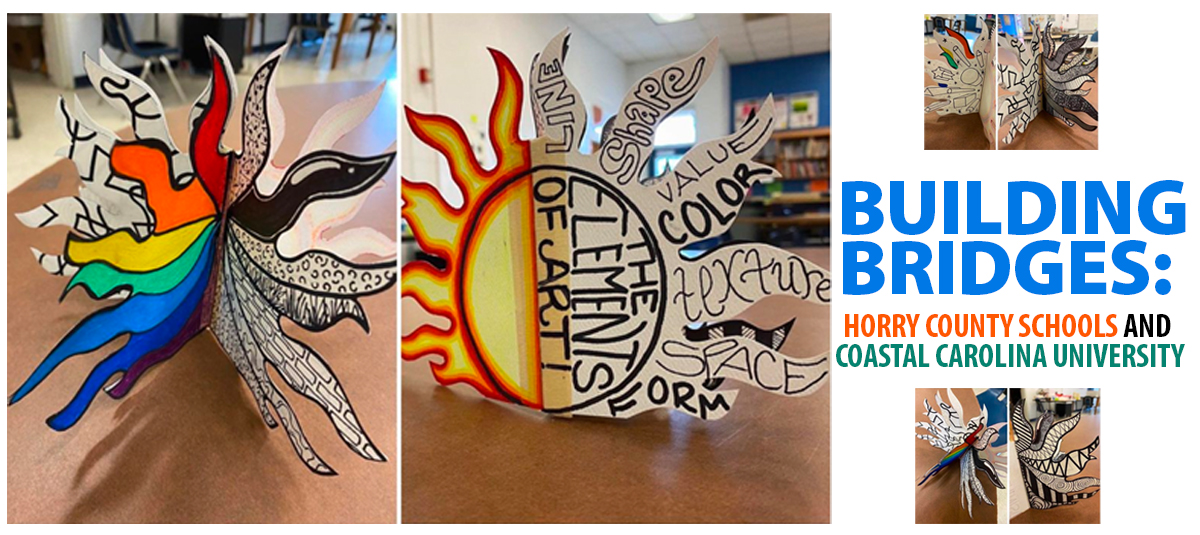Coastal Carolina University and Horry County Schools educators recently took to their Zoom screens in a collaborative partnership to build connections between the area’s K-12 and university-level instruction.
For 170 K-12 teachers, six CCU faculty, and two administrators, the February 15, 2021, HCS professional development day was dedicated to teaching, learning, and establishing relationships. Two separate 8-hour online workshop series were presented by faculty in CCU’s Department of Visual Arts and Department of Music, respectively. HCS art and music teachers attended a series of 3-hour workshops on topics that were both pragmatic and conceptual.
“We were able to provide professional development to our staff so they can better assist the elementary, middle, and high school students in our attendance areas,” said Scott Scrivner, Fine Arts Specialist for Horry County Schools.
Spearheaded by Scrivner and Stephanie Miller, professor and chair in CCU’s Department of Visual Arts, the initiative served a reciprocal purpose for HCS and CCU: to maximize the benefits of resources, expertise, and people that already live, work, and learn in our area.
“On the flip side, we have students within our school system that are looking for different options in visual and performing arts to continue their study, and we want them to consider Coastal as an appealing future option.”
“Because there are resources available within our community such as professors, we can look to the talented people here instead of hiring people online or from out of state to come here for professional development opportunities,” said Scrivner. “On the flip side, we have students within our school system that are looking for different options in visual and performing arts to continue their study, and we want them to consider Coastal as an appealing future option.”
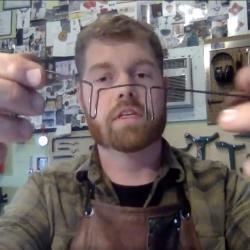 As part of CCU’s overarching commitment to developing a renewed focus on the local area, both through community programming and recruitment of students from Horry County and Georgetown County Schools, this faculty development day filled an important objective for the university. Logan Woodle, associate professor in the Department of Visual Arts who played a leading role in facilitating the workshops, emphasized the centrality of this mission.
As part of CCU’s overarching commitment to developing a renewed focus on the local area, both through community programming and recruitment of students from Horry County and Georgetown County Schools, this faculty development day filled an important objective for the university. Logan Woodle, associate professor in the Department of Visual Arts who played a leading role in facilitating the workshops, emphasized the centrality of this mission.
“At face value the goal was to provide content that those teachers could take directly back into the classroom, but the reality – and, I think, the much more important goal – is that Horry County Schools and Coastal Carolina University should be working hand in glove; we should have a symbiotic relationship. It just seems like with all the collective outreach from both [CCU President Michael Benson] and [Thomas W. and Robin W. Edwards College of Humanities and Fine Arts Dean Claudia Bornholdt], it was the department’s turn to step up and really start building this bond.”
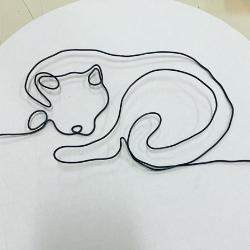 All workshop content was custom-created with required materials and instruments made available to teachers and designed with broad applications in mind.
All workshop content was custom-created with required materials and instruments made available to teachers and designed with broad applications in mind.
“It was the strangest, most challenging and most awesome prep and implementation ever,” said Woodle. “Every workshop was designed to be applied to a kindergartener up to a senior in high school. Seeing how [the teachers] took a base lesson and expanded it out – it was like a choose-your-own adventure: if they’re here, you do this; if they’re there, you do this. At the same time, I learned to put it in the teachers’ hands and listen to what they need and what they respond to.”
The workshops also accounted for K-12 teachers’ expertise.
“We as college professors are great at critical thinking; we’re steeped in our research,” said Woodle. “But these folks are really taught to teach, and they are boots on the ground every day, thinking about how this works. So, the idea was definitely not to give them a ready-made lesson – they are far more qualified than that, far more educated than that – but instead to give them a new tool to accomplish their goals.”
Leigh Hughes, assistant professor of graphic design, and Jeremy Brooks, assistant professor of ceramics, both in CCU’s Department of Visual Arts,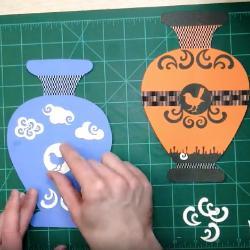 created scaffolded-type lessons to fit the broad range of classroom learners.
created scaffolded-type lessons to fit the broad range of classroom learners.
“I gave a demonstration on using paper in a 3-dimensional way to make some sculptural pottery forms,” said Brooks. “I designed the workshop to be accessible for various age groups, so I talked about how I would approach it for early studies, sketch work for a mid-level education, to more advanced forms. It started with a really simple task, kind of like making paper snowflakes: you cut, fold, you get a pottery shape. And then by taking more sheets of paper and making a book, you get something that’s multi-dimensional, just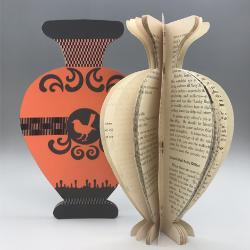 kind of pushing that model further.”
kind of pushing that model further.”
Scrivner said the CCU faculty exceeded his expectations in regard to planning, professionalism, and engagement, not to mention the enthusiasm conveyed to him by HCS teachers.
“As soon as the sessions were over, I was a little surprised to get immediate positive feedback from so many of the teachers,” said Scrivner. “Visual arts teachers were thrilled with the sessions that they attended, and the performing arts teachers were grateful to learn additional strategies and perspectives on how to foster student success.” 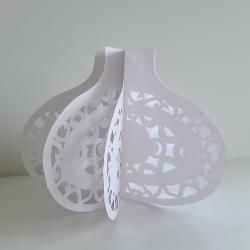
Sara Farrington, Carolina Forest High School art teacher and former Teacher of the Year at Green Sea Floyds Middle School, represents another dimension to the HCS-CCU connection. As an alum of both institutions (Carolina Forest High School ‘05, CCU ’09 BA in art studio and ’10 MAT in art education), she fully understands and appreciates the benefits of both educational systems.
“Any kind of collaboration between Horry County Schools and Coastal Carolina University is very special to me,” said Farrington, who also recently exhibited her original work at the Burroughs-Chapin Art Museum. “We want to make sure students understand what great programs are available right here, as I learned from first-hand experience.”
Another educational benefit of the workshops was a focus on the transition between high school and college education. David Carter, assistant professor of music education in CCU’s Department of Music, worked as a high school teacher and band director earlier in his career, so he understands both sides of the equation from both a student and teacher perspective.
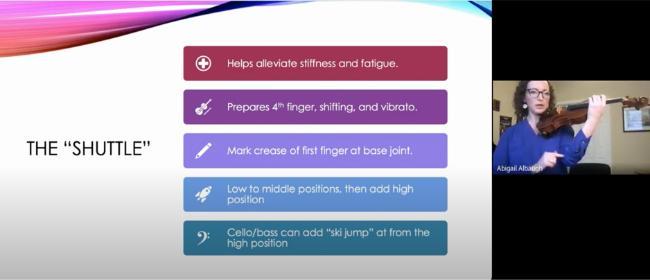 “I know these students. I know the community. I know the teachers. I definitely feel comfortable addressing the transition between high school and college,” said Carter. “At the same time, I’ve worked in the trenches of being in the classroom all day, teaching and leading a band. I’m trying to think ahead as to what these teachers can use as ammo, to bring fuel to the fire and make sure they’re successful and not burning out.”
“I know these students. I know the community. I know the teachers. I definitely feel comfortable addressing the transition between high school and college,” said Carter. “At the same time, I’ve worked in the trenches of being in the classroom all day, teaching and leading a band. I’m trying to think ahead as to what these teachers can use as ammo, to bring fuel to the fire and make sure they’re successful and not burning out.”
Timothy Koch, CCU lecturer and director of choral activities in CCU’s Department of Music, emphasized how much K-12 teachers and university instructors can learn from each other about student needs at the high school/university juncture.
“We can share what can they do to get kids ready for college, and they can share what can we do to make college more attractive to their kids.”
“These kinds of learning opportunities help us work on making that transition more seamless,” said Koch. “We can share what can they do to get kids ready for college, and they can share what can we do to make college more attractive to their kids.”
The very nature of the fine and performing arts is collaborative, said Abby Albaugh, teaching associate in the Department of Music who held a workshop on stringed instrument instruction.
“Everything works together in the arts; there’s not a sector of the arts that should be disjunct from another,” said Albaugh. “These interconnections and interdisciplinary relationships help us be in touch with students for a holistic improvement in the quality of education around the county.”
“These interconnections and interdisciplinary relationships help us be in touch with students for a holistic improvement in the quality of education around the county.”






